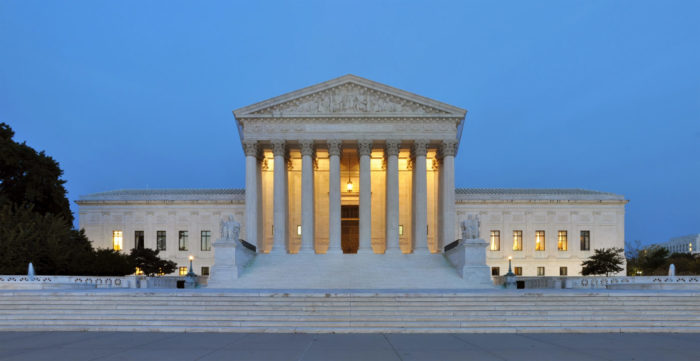U.S. Supreme Court Rules in Favor of School Choice!

Today, in a long-awaited ruling on state Blaine Amendments, the U.S. Supreme Court ruled in favor of three Montana mothers who wished to enroll their children in religious schools with the assistance of a scholarship.
Read More...
Some Ongoing Challenges to State Blaine Amendments and Clauses

Since the Trinity Lutheran ruling the Institute for Justice has taken a very active role in helping bring down state Blaine amendments, as they constitute a major barrier to school choice.
Read More...
Advisory Committee to the U.S. Commission on Civil Rights Releases Report on Colorado’s Blaine Clauses

A newly released report entitled “The Colorado Constitution’s No Aid To Sectarian Institutions Clause and its Impact on Civil Rights,” examines the origins of the Colorado Constitution’s No Aid Clause (known as Blaine Amendments), and the historical and modern applications.
The report was authored by members of the Colorado Advisory Committee to the U.S. Civil Rights Commission. Independence Institute’s Research Director, David Kopel, serves on the committee as the Vice-Chair.
Nineteenth century Blaine clauses banned public dollars from supporting sectarian-religious organizations which society viewed unfavorably, including Catholicism, Judaism, Mormonism, and Islam. Mainstream Protestant denominations were not considered to be sectarian.
The report details how the clause impacts civil rights in education, students with disabilities, higher education scholarships, and lists eight state-funded voucher-like programs that provide funding for programs at religious institutions.
Read More...
New Evidence Reveals Why 19th Century Bans on Sectarian Aid are Unconstitutional
I misinterpret things my mom tells me to do all the time. Somehow “pick up your toys” sounds a lot like “go watch T.V.” when my favorite show is on. Those phrases are interchangeable to me. But, treating words that aren’t synonyms as interchangeable can have consequences–as I find out when my mom catches me watching Nickelodeon instead of doing my chores. In recent years, the meaning of sectarian has been conflated with the meaning of religious–especially in the debate surrounding Blaine Amendments. In his article in the Federalist Society Review, “Why Nineteenth Century Bans on ‘Sectarian’ Aid Are Facially Unconstitutional: New Evidence on Plain Meaning,” the Independence Institute’s constitutional jurisprudence expert Rob Natelson defines the critical difference between “sectarian” and “religious,” and the consequences this misinterpretation has led to in private school choice. Mr. Natelson’s article is comprised of three primary sections that support his claim: 1. Nineteenth Century Constitutional Provisions Show that “Sectarian” Had a Meaning Separate from “Religious” or “Denominational” This section focuses on the drafting of state constitutions and how the terms religious, denominational, and sectarian are used separately. Each has a distinguished meaning and are not used interchangeably in their respective clauses. 2. The Nineteenth […]
Read More...
Adults Sometimes don’t Play Nice
Just last week, the newly elected Douglas County school board voted to officially abolish the district’s innovative school voucher program. Consequently, the district will also be rescinding its involvement in the Supreme Court case that will determine the constitutionality of voucher programs here in Colorado. Ross Izard, the senior fellow of the Independence Institute Education Policy Center and a noteworthy supporter of the “choice” defendants of the DougCo case, wrote an affecting op-ed titled A suburban school board just set back educational opportunity for all Americans that was published in The Hill and describes the consequences of removing the groundbreaking voucher program from Douglas County. Douglas County’s voucher program has long been in the spotlight– the constitutionality of Blaine Amendments was originally questioned and brought to court in 2011. Since then it has been a divisive debate, especially so in this year’s school board election. Other events, such as the role Betsy DeVos in school choice, have additionally stoked the fire of the school voucher debate, putting the DougCo decision on a national stage. Following the results of the election, the union backed, anti-school choice board members have dictated the end of a unique program that had the potential to bring improved […]
Read More...
Union Wins Bragging Rights
The Douglas County School Board election results were disappointing: The union backed, anti-reform slate of candidates won with the help of a last minute, 300,000-dollar push by the American Federation of Teachers (AFT). Douglas County’s unique district funded school-voucher program will likely, but not certainly, end. Pam Benigno, the director of the Education Policy Center at the Independence Institute, elaborated on the results of the election in The Denver Post, stating that: “No doubt they [the union backed slate] will end the [Choice Scholarship] program and no longer defend it through the court system. No doubt the union’s prize for winning the election will be a collective bargaining agreement and national bragging rights that they killed the nation’s first local school board voucher program.” While strong union involvement was an important factor in the election, the union backed candidates were also able to capitalize on the current political environment. The Trump/DeVos hysteria, when paired with the recent criticism of charter schools by groups such as the ACLU and NAACP, has created political turmoil that has masked the success of school choice programs across the county. These forces have created uncertainty about the legitimacy of charter schools, and reintroduced the stale […]
Read More...
AFT “so far” pumps $600,000 into School Board Race
Remember the Douglas County School Board race? The Toxic-Trio, tire scraps, Blaine Amendments, and what not? Of course you do. The Doug Co race has been one of Colorado’s most eminent issues for months. Well, mail-in ballots have arrived in homes, and with just minutes to go in the bottom of the ninth, the nation’s second largest teacher’s union has made a desperate attempt to sway the outcome of the election in its favor. The Douglas County School Board race has garnered much national attention–and rightly so. It will not only determine the fate of private school choice in Douglas County, but could determine the constitutionality of Blaine clauses in Colorado. It’s a pivotal moment in education, which is why the American Federation of Teachers (AFT) is adamantly attempting to manipulate the election to fit its political agenda. Ross Izard, senior policy analyst at the Independence Institute and my favorite policy nerd, details the recent uncovering of an additional 300,000-dollar donation AFT made to the Douglas County race (after its initial 300,000-contribution) in his op-ed A national teachers’ union’s war machine is on the move in Colorado, which was published in The Hill. In total, AFT has donated 600,000 dollars to […]
Read More...
Summer break was exciting for school choice!
It has been a long summer break, but I’m back watching over education in Colorado! And, oh my, what a summer it has been for school choice! On June 26, the Supreme Court of the United States ruled 7-2 in favor of tire scraps. Huh? Tire scraps? That’s right, tire scraps. A private, church-affiliated preschool in Missouri applied for the provisioning of tire scraps for playground resurfacing under a state grant program, but was turned down because of their church affiliation under the Missouri State Constitution’s Blaine clauses. The school challenged the decision in court. The case, Trinity Lutheran v. Comer, made it all the way to our country’s high court, which decided that First Amendment freedom of religion rights supersede the discriminatory Blaine clauses of Missouri’s State Constitution. The U.S. Supreme Court’s decision means that just because the preschool was affiliated with a church, that should not prevent them from being eligible for the State’s tire scrap grant program. Okay, why should Colorado care about tire scraps in Missouri? In light of this ruling, the U.S. Supreme Court decided not to rule on another Blaine-related case—the case regarding Douglas County School District’s Choice Scholarship Program (CSP). Let’s back up […]
Read More...
Trinity Lutheran Gets Its Day in Court
This week is a big week in the world of education law. Today, the U.S. Supreme Court will take up its first case related to state constitutional Blaine clauses. We talked about these ugly little pieces of constitutional language in some detail last week when I highlighted the Independence Institute’s new paper, Blaine’s Shadow: Politics, Discrimination, and School Choice. Check out that paper if you need some historical background on Blaine clauses and what they mean for education today. Before you ask, the court isn’t considering the Dougco voucher case tomorrow. We’re still waiting to find out whether SCOTUS will hear that one. Instead, the high court will hear oral arguments in Trinity Lutheran v. Pauley, which deals with a Blaine-related case out of Missouri. We’ve talked about that case in passing over the year or so since I wrote about it in detail, but a refresher is probably in order. From my previous post: Here’s the skinny: Missouri runs a program under which organizations can apply to the state for grants. That’s not unusual. But here’s the trick: these “grants” do not come in the form of money. They come in the form of scrap rubber. That rubber is used […]
Read More...
History! Blaine's Shadow Tells an Important Story
James G. Blaine. You’ve heard that name before, right? Of course you have. I’ve written about Congressman Blaine a number of times, usually in the context of Douglas County’s ongoing legal battle against so-called “Blaine Amendments” through its first-of-its-kind local voucher program. Or maybe I should say programs (plural), as the district’s other voucher program made things pretty complicated for a while before a debatable court decision and a new decision by the board put an end to most of the legal craziness. But while we’ve talked a fair amount about Blaine and the state constitutional clauses named after him, I’m not sure we’ve ever really known the full story. There’s a lot of important history and drama and politics buried behind the simple narrative that most folks just don’t know. Ross Izard, my favorite policy nerd, set out to tell that story—and to explain why it matters from a constitutional perspective—in his most recent issue paper, Blaine’s Shadow: Politics, Discrimination, and School Choice.
Read More...




